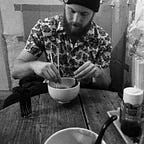Second Dimension
In March, the world got flatter.
I’m not saying conspiracy theory, flat-earther flat. I mean flat. Everything compressing to points on a line. Two-dimensional. Compressed to a single axis. How else could you explain it?
March was the first time I made a decision based on that virus. On the second weekend, specifically. It was a Saturday night. Someone planned to get together at someone else’s house. A few cases of cheap beer would be wedged into the fridge. Twenty-somethings growing closer to being labeled by their third decade than not, huddled on the yellowing grass of a rental home. The air punctuated occasionally by skunk-hinted whiffs of marijuana drifting from a basement window. Periodic hints of the world emerging from winter passed by carried onward the breeze.
At least, that’s how I pictured it being. That evening, something was gnawing at me. News of recent outbreaks in Seattle and New York were, unknown to me at the time, slowly cementing the foundations of a new reality. With stories filtering in of cases starting to appear in my city, I decided to stay home that evening. I sent a quick, apologetic text out and turned off my phone. My little way of avoiding losing face for canceling on plans.
The neighborhood that we were to gather, informally referred to as The Avenues, contains post-war homes inching past the point of fifty years of age. It’s probably longer than that, I’m no expert. The avenues in question spread perpendicularly on a steep slope, with property values diminishing as you gain in elevation, the population inversely growing younger the higher you climb. It was near the neighborhood’s apex where, that night, my friend Eric skateboarded down, reaching terminal velocity before losing control.
He hit his head, and the great flattening had begun.
At that point, all information became secondhand information. Hospital visits restricted to family-only. No gathering to process what had happened. Updates of progress laden with anxieties were relayed through a few phone calls rather than delivered in sterile hospital air through the masked voice of an exhausted medical professional. After that point, the virus. The citation, the excuse on everyone’s tongue: “I would, but the virus…”
A few days later, an earthquake shook the valley, the earth groaning and shuddering as the pressure began to compound. I had a second job unloading trucks at a wine store at the time. At first, we thought the shaking was just another truck driving by the store until the bomb-like, staccato bursts of champagne bottles falling from the shelves sounded out a warning that staying indoors any longer could prove to be dangerous. We rushed outside to take ‘shelter’ in the middle of the empty parking lot, as far as we could be from manmade structures.
The sky periodically flashed purple and green frustrations into the sky, electricity escaping outward in protest against being so rudely awoken. The earth undulated beneath our feet, the metal frames of the warehouses surrounding us groaned. Suddenly, without warning, the earth stopped shaking and an uneasy calm settled over the morning.
We tiptoed back into the store to assess the damage, setting to work sweeping and mopping up the detritus that smelled like a frat house basement. Aftershocks served as reminders of the capabilities of earth unsettled. These days, the popping of a building’s foundation or a gust of wind causing a structure to shift is all it takes to make my breathing rapid and start my eyes darting around for the quickest escape route.
The world flattened further.
As time went on, the pandemic caused life to be spread increasingly thin. Interactions of all shapes and forms became something experienced more through a screen than not. Coworkers with whom I would share a significant portion of my waking hours were reduced to pixels on a screen. Zoom meetings, awkward to begin with, began to take control of how the world gazed back at us. Cues became harder to read, if not impossible, virtually I want to say. Conversations grew awkward, everything scheduled in advance, meaning that everything seemingly required a purpose. Life-restoring, humanizing banter kept to a minimum; cameras turned off with increasingly frequent as time went on. Further compression, an avatar even flatter than a video stream.
As time and space continued to draw closer to a single point, I began feeling the effects on my body. These days, breathing comes less easily. There’s a weight on my chest that wasn’t there before. Moments of uncertainty compounding through the breathing-through-a-straw effect of wearing a mask in summer.
In the Before Times, I would have written this off as just another physical manifestation of anxiety. This time, though, I know it’s because of The Great Flattening. How else could it be explained?
I wonder: Will we notice once we’re fully crushed?
